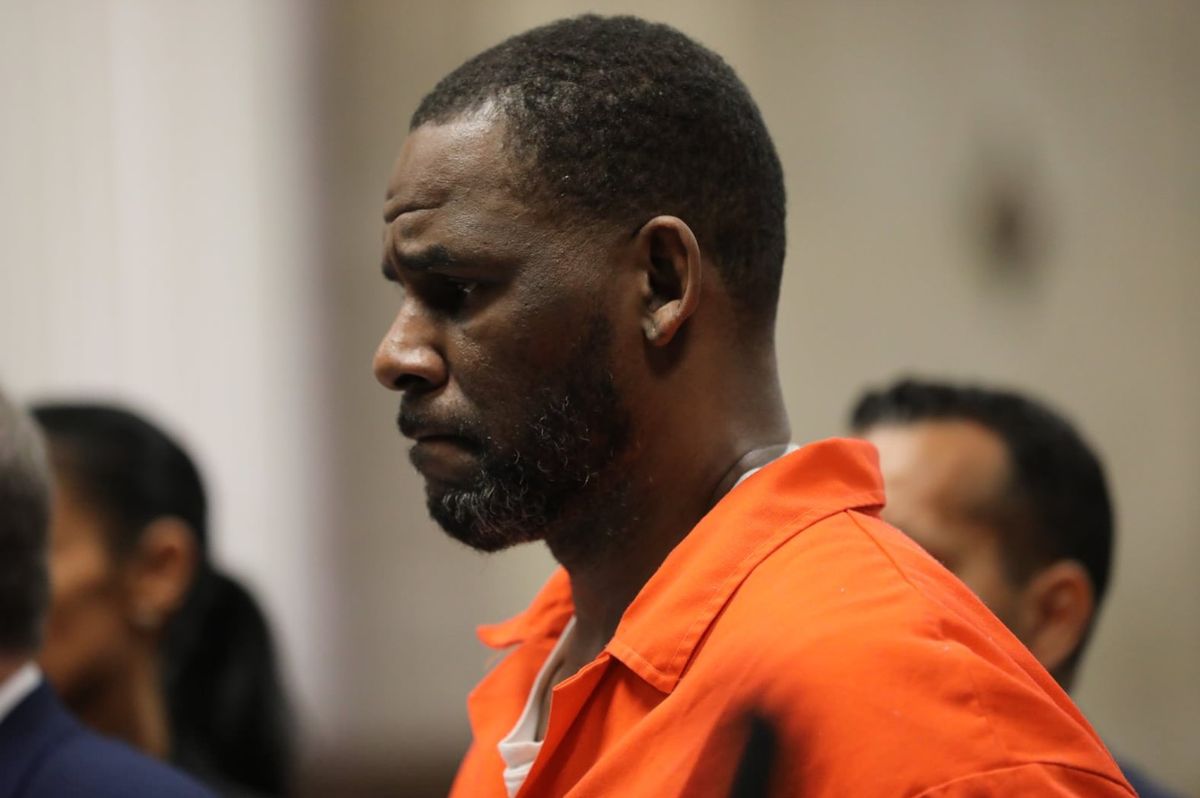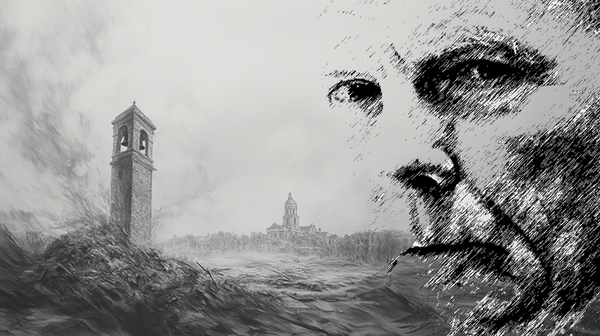R. Kelly convicted in sex trafficking trial
He faces the possibility of decades in prison for crimes including violating the Mann Act, an anti-sex trafficking law that prohibits taking anyone across state lines "for any immoral purpose." Sentencing is scheduled for May 4.

By TOM HAYS and LARRY NEUMEISTER | Associated Press
NEW YORK (AP) — R. Kelly, the R&B superstar known for his anthem "I Believe I Can Fly," was convicted Monday in a sex trafficking trial after decades of avoiding criminal responsibility for numerous allegations of misconduct with young women and children.
A jury of seven men and five women found Kelly, 54, guilty of all nine counts, including racketeering, on their second day of deliberations. Kelly wore a face mask below black-rimmed glasses, remaining motionless with eyes downcast, as the verdict was read in federal court in Brooklyn.
Prosecutors alleged that the entourage of managers and aides who helped Kelly meet girls — and keep them obedient and quiet — amounted to a criminal enterprise. Two people have been charged with Kelly in a separate federal case pending in Chicago.
He faces the possibility of decades in prison for crimes including violating the Mann Act, an anti-sex trafficking law that prohibits taking anyone across state lines "for any immoral purpose." Sentencing is scheduled for May 4.
One of Kelly's lawyers, Deveraux Cannick, said he was disappointed and hoped to appeal.
"I think I'm even more disappointed the government brought the case in the first place, given all the inconsistencies," Cannick said.
Several accusers testified in lurid detail during the trial, alleging that Kelly subjected them to perverse and sadistic whims when they were underage.
For years, the public and news media seemed to be more amused than horrified by allegations of inappropriate relationships with minors, starting with Kelly's illegal marriage to the R&B phenom Aaliyah in 1994 when she was just 15.
His records and concert tickets kept selling. Other artists continued to record his songs, even after he was arrested in 2002 and accused of making a recording of himself sexually abusing and urinating on a 14-year-old girl.
Widespread public condemnation didn't come until a widely watched docuseries, "Surviving R. Kelly," helped make his case a signifier of the #MeToo era, and gave voice to accusers who wondered if their stories were previously ignored because they were Black women.
"To the victims in this case, your voices were heard and justice was finally served," Acting U.S. Attorney Jacquelyn Kasulis said Monday.
Gloria Allred, a lawyer for some of Kelly's accusers, said outside the courthouse that of all the predators she's gone after — a list including Harvey Weinstein and Jeffrey Epstein — "Mr. Kelly is the worst."
At the trial, several of Kelly's accusers testified without using their real names to protect their privacy. Jurors were shown homemade videos of Kelly engaging in sex acts that prosecutors said were not consensual.
The defense labeled the accusers "groupies" and "stalkers."
Kelly's lawyer, Cannick, questioned why women stayed in relationships with Kelly if they thought they were being exploited.
"You made a choice," Cannick told one woman who testified, adding, "You participated of your own will."
Kelly, born Robert Sylvester Kelly, has been jailed without bail since in 2019. The New York case is only part of the legal peril facing the singer. He also has pleaded not guilty to sex-related charges in Illinois and Minnesota. Trial dates in those cases have yet to be set.
At the trial, prosecutors painted the singer as a pampered man-child and control freak. His accusers said they were under orders to call him "Daddy," expected to jump and kiss him anytime he walked into a room, and to cheer only for him when he played pickup basketball games in which they said he was a ball hog.
The accusers alleged they were ordered to sign nondisclosure forms and were subjected to threats and punishments such as violent spankings if they broke what one referred to as "Rob's rules." Some said they believed the videotapes he shot of them having sex would be used against them if they exposed what was happening.
Among the other more troubling tableaux: Kelly keeping a gun by his side while he berated one of his accusers as a prelude to forcing her to give him oral sex in a Los Angeles music studio; Kelly giving several accusers herpes without disclosing he had an STD; Kelly coercing a teenage boy to join him for sex with a naked girl who emerged from underneath a boxing ring in his garage; and Kelly shooting a shaming video of one alleged victim showing her smearing feces on her face as punishment for breaking his rules.
Of 14 possible racketeering acts considered in the trial, the jury found only two "not proven." The allegations involved a woman who said Kelly took advantage of her in 2003 when she was an unsuspecting radio station intern.
She testified he whisked her to his Chicago recording studio, where she was kept locked up and was drugged before he sexually assaulted her while she was passed out. When she realized she was trapped, "I was scared. I was ashamed. I was embarrassed," she said.
Other testimony focused on Kelly's relationship with Aaliyah. One of the final witnesses described seeing him sexually abusing her around 1993, when Aaliyah was only 13 or 14.
Jurors also heard testimony about a fraudulent marriage scheme hatched to protect Kelly after he feared he had impregnated Aaliyah. Witnesses said they were married in matching jogging suits using a license falsely listing her age as 18; he was 27 at the time.
Aaliyah, whose full name was Aaliyah Dana Haughton, worked with Kelly, who wrote and produced her 1994 debut album, "Age Ain't Nothing But A Number." She died in a plane crash in 2001 at age 22.
Kelly had been tried once before, in Chicago in a child pornography case, but was acquitted in 2008.
For the Brooklyn trial, U.S. District Judge Ann Donnelly barred people not directly involved in the case from the courtroom in what she called a coronavirus precaution. Reporters and other spectators had to watch on a video feed from another room in the same building, though a few were allowed in the courtroom for the verdict.
Associated Press writer Michael R. Sisak contributed to this report. See the AP's full coverage of the investigations into R. Kelly.
R. Kelly's life, from troubled talent to trafficking trial
NEW YORK (AP) — R. Kelly has long faced and denied allegations of lurid behavior and sex abuse. A jury has now found him guilty of sex trafficking in a federal trial in New York stemming from those allegations.
A timeline of Kelly's life:
-
Jan. 8, 1967: Robert Sylvester Kelly born in Chicago as third of four children of schoolteacher Joann Kelly. Little is known about his father.
-
1975: Kelly begins singing in church. Around that time, years of sexual abuse by an adult relative begins, according to his 2012 memoir.
-
1979: Kelly witnesses a rape at age 12.
-
1983: Mother moves family from Chicago housing projects and enrolls Kelly in the prestigious Kenwood Academy.
-
1984: Performs Stevie Wonder hit "Ribbon in the Sky" in a talent show. In following years, he performs in subway stations with his keyboard, often feigning blindness to avoid arrest.
-
1990: His R&B group MGM wins $100,000 grand prize on the show "Big Break." Jive Records executive Wayne Williams discovers Kelly singing at a barbecue.
-
January 1992: R. Kelly & Public Announcement debuts "Born Into The '90s." Album released the following year goes platinum.
-
November 1993: His album "12 Play" is released and eventually sells more than 5 million copies. Hit singles include "Sex Me" and "Bump N' Grind."
-
Aug. 31, 1994: At 27, R. Kelly marries 15-year-old singer Aaliyah D. Haughton in a secret ceremony. Marriage is annulled months later because of Aaliyah's age.
-
September 1994: Aaliyah's debut album, "Age Ain't Nothing But A Number," which Kelly produced, goes platinum. Aaliyah dies in a plane crash seven years later at age 22.
-
1996: Releases third album "R. Kelly" and incorporates Rockland Records. Song "I Believe I Can Fly" is a huge hit. Marries 22-year-old dancer Andrea Lee, and they go on to have three children: Joanne, Jaya and Robert Jr.
-
Feb. 18, 1997: Tiffany Hawkins files a complaint alleging sexual battery and harassment when she was a minor.
-
January 1998: Hawkins' lawsuit is reportedly settled for $250,000.
-
February 1998: Kelly wins three Grammys for "I Believe I Can Fly."
-
November 1998: Album "R." hits stores and eventually sells 6 million copies.
-
November 2000: Album "TP-2.com" debuts at No. 1.
-
August 2001: Tracy Sampson sues Kelly, alleging their sex was illegal under Illinois law because he was in a position of authority. Case is reportedly settled out of court.
-
Feb. 8, 2002: Chicago Sun-Times reports that it received a videotape showing Kelly having sex with a minor and that police had begun investigating related allegations three years earlier. The girl and her parents deny the relationship. The same day, Kelly performs at the opening ceremonies for the Winter Olympics in Salt Lake City.
-
June 5, 2002: Kelly indicted in Chicago on child porn charges stemming from the sex tape, pleads not guilty and is released on bail.
-
January 2003: Kelly is arrested at a Florida hotel on child porn charges after investigators say they found photos of him with a girl. Charges are later dropped after a judge rules police didn't have a warrant.
-
Feb. 18, 2003: Album "Chocolate Factory" is released to immediate success.
-
July 2005: Album "TP.3 Reloaded" hits No. 1.
-
September 2005: Andrea Kelly asks for order of protection, accusing her husband of hitting her when she asked for a divorce.
-
February 2006: Carey Kelly says his brother offered him $50,000 and a record deal to say he was the person in the sex video.
-
May 29, 2007: Album "Double Up" is released and later hits No. 1.
-
May 9, 2008: Child pornography trial begins.
-
June 13, 2008: Kelly is acquitted after fast jury deliberations.
-
Jan 8, 2009: Kelly and Andrea confirm they divorced.
-
July 12, 2011: Crain's Chicago Business reports a $2.9 million foreclosure was filed on Kelly's suburban Chicago mansion. Spokesperson says Kelly is not having financial trouble.
-
March 21, 2012: Kelly announces he is reviving a video series, "Trapped in the Closet," that eventually becomes a rap opera about a web of sexual deceit. There is talk of a Broadway show.
-
June 15, 2012: Chicago Sun-Times reports Kelly owes the IRS more than $4.8 million.
-
June 27, 2012: Publishes autobiography "Soulacoaster: The Diary of Me," focusing on his creative and family life.
-
March 18, 2013: Mansion once valued at more than $5 million sells for $950,000 at auction.
-
2017: BuzzFeed reports on parents' claims that Kelly brainwashed their daughters. Activists launch #MuteRKelly movement, calling for boycotts of his music.
-
Feb. 13, 2018: Kelly is evicted from two Atlanta-area homes over more than $31,000 in unpaid rent.
-
April 2018: Time's Up campaign joins #MuteRKelly and pushes for investigation. Kelly's camp responds: "We will vigorously resist this attempted public lynching of a black man who has made extraordinary contributions to our culture."
-
May 2018: Spotify cuts R. Kelly's music from its playlists. Apple and Pandora soon stop promoting his music.
-
May 21, 2018: Faith Rodgers, 20, sues R. Kelly, alleging sexual battery, mental and verbal abuse, and of knowingly inflicting her with herpes.
-
Jan. 3, 2019: Lifetime airs "Surviving R. Kelly," revisiting old allegations and airing new ones. It follows 2018's "R Kelly: Sex, Girls & Videotapes" on BBC.
-
Jan. 9, 2019: Lady Gaga says she will remove 2013 duet with Kelly from streaming services.
-
Jan. 14, 2019: Rodgers says Kelly threatened to reveal embarrassing details of her sexual history if she didn't drop May 2018 lawsuit.
-
Jan. 21, 2019: News reports say Kelly and his label, Sony subsidiary RCA Records, part ways. Fellow musicians including Celine Dion further distance themselves.
-
Feb. 6, 2019: Kelly tweets about a new tour of Australia, New Zealand and Sri Lanka, then deletes it following backlash.
-
Feb. 14, 2019: Attorney Michael Avenatti says he gave Chicago prosecutors new video evidence of Kelly with a girl.
-
Feb. 22, 2019: Kelly is arrested and charged with 10 counts of aggravated sexual abuse.
-
Feb. 25, 2019: Kelly pleads not guilty, posts bail and is released from Chicago jail.
-
March 2019: In CBS interview, Kelly denies sexual abuse charges. Authorities in Illinois take Kelly into custody after he tells a judge he can't pay $161,000 in back child support.
-
May 30, 2019: Kelly is charged with 11 new counts in Chicago involving a woman who accused him of abusing her when she was underage.
-
July 11, 2019: Kelly is indicted in Chicago on federal charges including child pornography. Separate federal indictment in New York includes charges of racketeering. He is again arrested in Chicago.
-
July 16, 2019: Judge orders Kelly held without bond.
-
Aug. 2, 2019: Kelly pleads not guilty to sexually abusing women and girls who attended his concerts. His lawyers call them disgruntled groupies.
-
Aug. 5, 2019: Kelly is charged in Minnesota with soliciting a 17-year-old.
-
Oct. 2, 2019: Kelly is denied bail in his New York City case.
-
Dec. 5, 2019: Kelly is charged with paying a bribe in exchange for a "fraudulent identification document" a day before he married Aaliyah. He later pleads not guilty.
-
March 5, 2020: Kelly pleads not guilty in Chicago to an updated federal indictment that includes a new accuser.
-
Aug. 12, 2020: Charges announced against three men accused of threatening and intimidating women who accused Kelly of abuse.
-
Aug. 14, 2020: Kelly's manager is arrested in California on charges that he threatened a shooting at a Manhattan theater two years before, forcing the cancellation of a screening of a documentary about allegations against R. Kelly.
-
July 24, 2021: Federal prosecutors say Kelly had sexual contact with a boy in addition to girls, and the government wants trial jurors to hear those claims.
-
Aug. 18, 2021: Opening statements begin in Kelly's federal trial in New York.
-
Sept. 24, 2021: Jury begins deliberating in the New York trial, even as trial dates in Illinois and Minnesota cases remain to be set.
-
Sept. 27, 2021: The jury finds R. Kelly guilty of sex trafficking and violating the Mann Act, which makes it illegal to take anyone across state lines "for any immoral purpose."
See the AP's full coverage of the investigations into R. Kelly.





